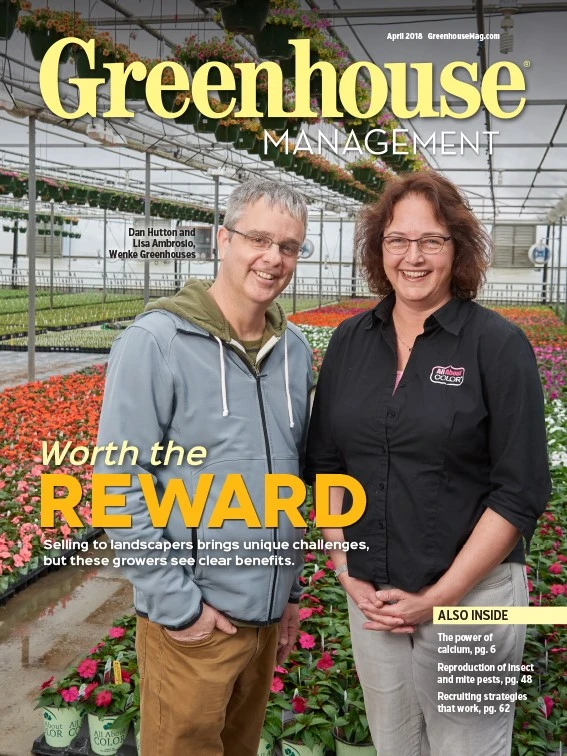
Building on more than 30 years of greenhouse experience, Bill Hall’s home garden reflects his colorful career in plant production and propagation.
“Being a woody plant propagator for many years, my garden is comprised of mostly woody ornamentals. Camellias, magnolias and michelia are among my favorite garden plants,” says Hall, an avid gardener who also enjoys perennials and flowering vines like clematis.
Now, a year after joining Hoffman Nursery in Rougemont, North Carolina, as head grower overseeing 150 varieties of grass, sedge and rush liners, Hall is ready to add native Carex and Schizachyrium to his garden, too.
Just as his plant collection has evolved over the years, Hall continues to add new skills, tools and experience to his repertoire as he strives to make growing operations more efficient, sustainable and successful wherever he goes.
Finding a fit
In college, Hall majored in agriculture, but his focus back then was on animal science, and he had plans to pursue veterinary medicine. After graduation, he realized that the horticulture industry was a better fit.
“The thing I like about working in this industry, particularly in growing, is that it requires elements of both science and art, coupled with working outdoors,” Hall says. “I derive a tremendous sense of accomplishment from producing a good crop of plants.”

His horticulture career began in the early 1980s, when he started working in a foliage greenhouse in Apopka, Florida. His first role as grower was at Oakdell Nursery in Plymouth, Florida, where he advanced into supervisory roles and eventually managed a location in Apopka.
Hall spent most of his career with Carolina Nurseries as a propagator and production manager growing woody ornamentals and perennials. He also worked at AG 3, a tissue culture lab in central Florida, and ArborGen, a pine seedling nursery in South Carolina, before joining Hoffman Nursery — a company he’d known through the years as both a customer and supplier.
Hall’s growing team at Hoffman Nursery comprises seven growers and three assistants, who manage 200,000 square feet of indoor growing space and 18 acres of stock fields available to provide plant material for liner production. Hall’s department works closely with Hoffman Nursery’s production supervisor and his staff of 22, to produce quality grass, sedge and rush liners for wholesale customers.
Innovating to improve
“My goal as head grower at Hoffman Nursery is to implement improved methods of ornamental grass production while maintaining or increasing the quality our customers have come to expect,” says Hall, who joined the company in January 2017.
To achieve that goal, Hall has been busy innovating Hoffman Nursery’s growing operations since he arrived — introducing new ideas while also helping integrate changes that began at the nursery several years ago.
For example, in 2015, Hoffman Nursery started erecting new, automated greenhouses featuring Argus environmental controls, irrigation booms and concrete floors with bottom heat. The third and final phase of construction was completed in February 2018. Hall and his team continue working to optimize this new technology to efficiently improve plant production and quality.
“The new greenhouses have more than doubled our heated space,” Hall says. “Managing this new space with both warm and cool season grasses requires some planning and coordination. Winter propagation of dormant grasses can be challenging and providing the perfect environment for a vast array of cultivars sharing a large growing space has been a learning experience.”

Those challenges are what makes the job exciting, he says. Integrating these new technologies encourages collaboration between Hoffman’s production and growing teams, who meet regularly to troubleshoot and strategize.
“The biggest challenge facing the growing department is integrating our new facilities, growers and new production methods,” Hall says. “My job is to manage those changes and help our team grow and learn from them.”
Growing green
Just as Hall strives to limit his use of pesticides in his home garden, he shares Hoffman Nursery’s commitment to environmental stewardship in its operations. Several years ago, the company began supporting green infrastructure and promoting its native grass liners for sustainable projects involving stormwater control, soil stabilization and wildlife habitats.
Naturally, that commitment guides Hall’s sustainable approach to growing.
“In our growing program, we are trialing the use of sustainable substrates in our growing mix,” says Hall, who has seen positive results using HydraFiber, a mix of reclaimed wood from the timber industry, in his growing media. “We have pledged to eliminate neonicotinoids from our spray program in 2018, and we are incorporating biological controls into our IPM program.”
By leveraging his depth of industry experience and his insatiable passion for exploring new growing methods, Hall continues to perfect the art and science of his job.
“This industry is constantly changing and evolving, and it offers the opportunity to never stop learning,” he says. “The best advice I can give growers is to avoid becoming complacent. There are always innovative ideas and approaches to explore and implement.”

Explore the April 2018 Issue
Check out more from this issue and find your next story to read.
Latest from Greenhouse Management
- Anthura acquires Bromelia assets from Corn. Bak in Netherlands
- Top 10 stories for National Poinsettia Day
- Langendoen Mechanical hosts open house to showcase new greenhouse build
- Conor Foy joins EHR's national sales team
- Pantone announces its 2026 Color of the Year
- Syngenta granted federal registration for Trefinti nematicide/fungicide in ornamental market
- A legacy of influence
- HILA 2025 video highlights: John Gaydos of Proven Winners





